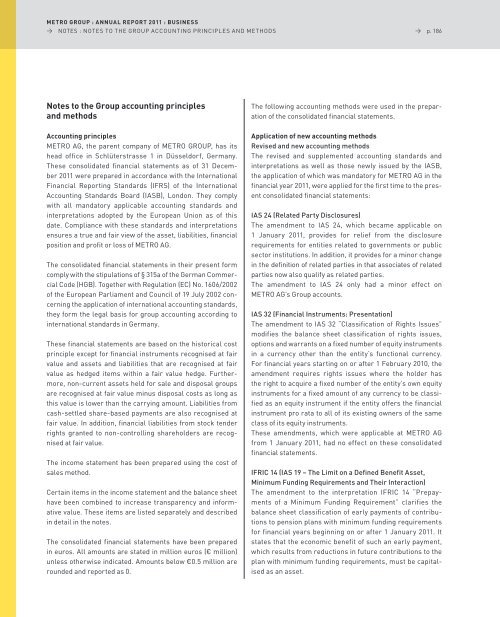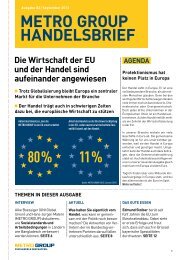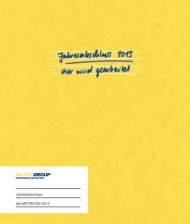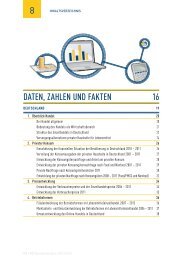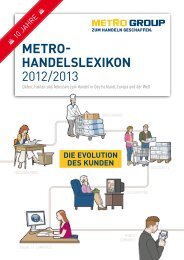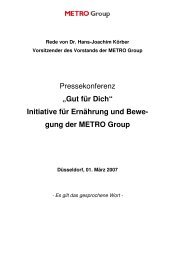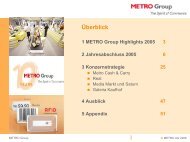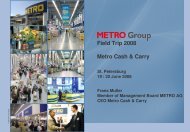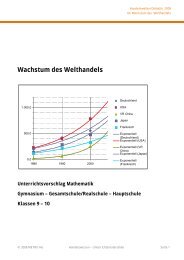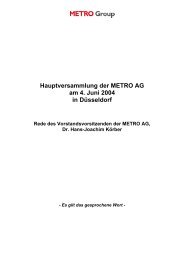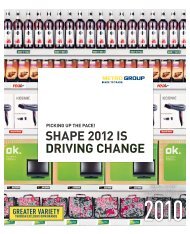pdf (22.8 MB) - METRO Group
pdf (22.8 MB) - METRO Group
pdf (22.8 MB) - METRO Group
You also want an ePaper? Increase the reach of your titles
YUMPU automatically turns print PDFs into web optimized ePapers that Google loves.
<strong>METRO</strong> gROUP : ANNUAL REPORT 2011 : BUsiNEss<br />
→ noTes : noTes To THe GRoUp aCCoUnTInG pRInCIples anD MeTHoDs<br />
Notes to the group accounting principles<br />
and methods<br />
Accounting principles<br />
MeTRo aG, the parent company of MeTRo GRoUp, has its<br />
head office in schlüterstrasse 1 in Düsseldorf, Germany.<br />
These consolidated financial statements as of 31 December<br />
2011 were prepared in accordance with the International<br />
Financial Reporting standards (IFRs) of the International<br />
accounting standards Board (IasB), london. They comply<br />
with all mandatory applicable accounting standards and<br />
interpretations adopted by the european Union as of this<br />
date. Compliance with these standards and interpretations<br />
ensures a true and fair view of the asset, liabilities, financial<br />
position and profit or loss of MeTRo aG.<br />
The consolidated financial statements in their present form<br />
comply with the stipulations of § 315a of the German Commercial<br />
Code (HGB). Together with Regulation (eC) no. 1606/2002<br />
of the european parliament and Council of 19 July 2002 concerning<br />
the application of international accounting standards,<br />
they form the legal basis for group accounting according to<br />
international standards in Germany.<br />
These financial statements are based on the historical cost<br />
principle except for financial instruments recognised at fair<br />
value and assets and liabilities that are recognised at fair<br />
value as hedged items within a fair value hedge. Furthermore,<br />
non-current assets held for sale and disposal groups<br />
are recognised at fair value minus disposal costs as long as<br />
this value is lower than the carrying amount. liabilities from<br />
cash-settled share-based payments are also recognised at<br />
fair value. In addition, financial liabilities from stock tender<br />
rights granted to non-controlling shareholders are recognised<br />
at fair value.<br />
The income statement has been prepared using the cost of<br />
sales method.<br />
Certain items in the income statement and the balance sheet<br />
have been combined to increase transparency and informative<br />
value. These items are listed separately and described<br />
in detail in the notes.<br />
The consolidated financial statements have been prepared<br />
in euros. all amounts are stated in million euros (€ million)<br />
unless otherwise indicated. amounts below €0.5 million are<br />
rounded and reported as 0.<br />
→ p. 186<br />
The following accounting methods were used in the preparation<br />
of the consolidated financial statements.<br />
Application of new accounting methods<br />
Revised and new accounting methods<br />
The revised and supplemented accounting standards and<br />
interpretations as well as those newly issued by the IasB,<br />
the application of which was mandatory for MeTRo aG in the<br />
financial year 2011, were applied for the first time to the present<br />
consolidated financial statements:<br />
IAS 24 (Related Party Disclosures)<br />
The amendment to Ias 24, which became applicable on<br />
1 January 2011, provides for relief from the disclosure<br />
requirements for entities related to governments or public<br />
sector institutions. In addition, it provides for a minor change<br />
in the definition of related parties in that associates of related<br />
parties now also qualify as related parties.<br />
The amendment to Ias 24 only had a minor effect on<br />
MeTRo aG’s <strong>Group</strong> accounts.<br />
IAS 32 (Financial Instruments: Presentation)<br />
The amendment to Ias 32 “Classification of Rights Issues”<br />
modifies the balance sheet classification of rights issues,<br />
options and warrants on a fixed number of equity instruments<br />
in a currency other than the entity’s functional currency.<br />
For financial years starting on or after 1 February 2010, the<br />
amendment requires rights issues where the holder has<br />
the right to acquire a fixed number of the entity’s own equity<br />
instruments for a fixed amount of any currency to be classified<br />
as an equity instrument if the entity offers the financial<br />
instrument pro rata to all of its existing owners of the same<br />
class of its equity instruments.<br />
These amendments, which were applicable at MeTRo aG<br />
from 1 January 2011, had no effect on these consolidated<br />
financial statements.<br />
IFRIC 14 (IAS 19 – The Limit on a Defined Benefit Asset,<br />
Minimum Funding Requirements and Their Interaction)<br />
The amendment to the interpretation IFRIC 14 “prepayments<br />
of a Minimum Funding Requirement” clarifies the<br />
balance sheet classification of early payments of contributions<br />
to pension plans with minimum funding requirements<br />
for financial years beginning on or after 1 January 2011. It<br />
states that the economic benefit of such an early payment,<br />
which results from reductions in future contributions to the<br />
plan with minimum funding requirements, must be capitalised<br />
as an asset.


